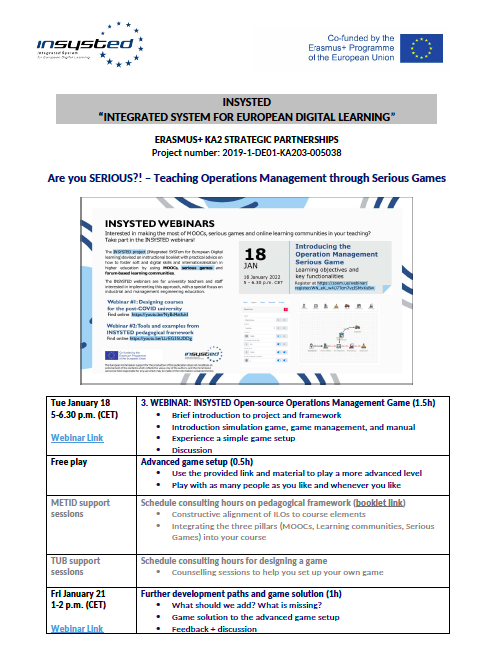
The teacher LTT was conducted virtually in January 2022 using Zoom. A total of 43 professors and researchers from across Europe participated in the webinar, which was the kick-off event of the training. The main goal was take a deep dive into the game, get perspective on its usability and the possibility of its integration in courses, as well as discussing the challenges and taking feedback from the perspective of professionals.
The event was divided into three main parts. On the introductory session, the game was thoroughly presented to the participants. First, the project context and goals were clearly presented, then we moved to a detailed explanation of the game, its interface, how to create an instance as a teacher and how to play the game as a student.
All game modes and complexity levels were differentiated. Those were mainly set up in three levels:
– Level 1: Inventory management (deterministic + stochastic)
– Level 2: Capacity management
– Level 3: Contract management
Furthermore, we presented the participants with all our content, our guide manual, our Git repository as well as our Cheat-sheet for the game. Then we played a simple instance of the game, where we presented the students’ perspective on the game and every participant got to experience it for themselves. Then we held a first round of discussion using a Miro board where participants had the opportunity to share their thoughts on what could be the advantages of the game, what are its critical points and what could be potential pitfalls, then all the points that were hanged on the whiteboard were discussed. What the participants thought of as advantages to the game didn’t come as a surprise, it all had to do with the fact that it provides a dynamic experience close to the real world, i.e. the purpose of the game. The criticism was divided in two main categories, the fact that the game is unplayable for people with no background knowledge, and the fact that the server crashed in the middle of the game. This specific crash led us to take multiple steps towards avoiding a similar issue, so we changed our host and extended our RAM. A similar crash hasn’t happened since.
The second part of the event was a task that was done individually throughout the week, where participants got the opportunity to experiment with the game and play an advanced version of the game, and were offered Option to schedule a consultation to integrate the game into teaching or to design their own game. All of which was in preparation for the final day, where we held a discussion about how the game could be improved, we dove into every suggestion and the possibility of integrating it. Suggestions varied from what would be nice to have, to what is a must have. A lot of ideas went in different directions and we adopted those that were aligned with our view on the game and we wanted to achieve with it, others were not possible to implement without fundamentally changing the game.
